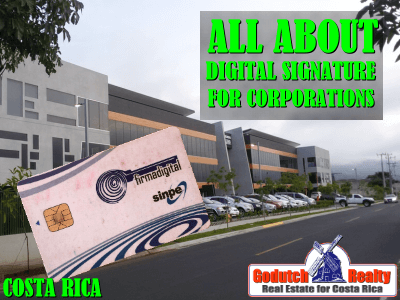 Firma Digital is a digital signature, which is used for making or signing an electronic document using the technology known as public-key cryptography.
Firma Digital is a digital signature, which is used for making or signing an electronic document using the technology known as public-key cryptography.
It allows you to digitally sign a document. Only as such will a document be received and accepted by the Costa Rican government or finance agency. The card is personal, and meant for the person who has the powers of attorney for the corporation. Usually, that is the President of the corporation.
If that person is the power of attorney for more than one corporation, the same card is used for all corporations.
In Costa Rica, the majority of banking institutions accept the digital signature and there are over 26 government agencies currently using a digital signature platform.
You might be surprised to learn that the Digital Signature Law has been in effect since 2005. That’s when the legislature passed Law 8454. This is the LEY DE CERTIFICADOS, FIRMAS DIGITALES Y DOCUMENTOS ELECTRÓNICOS. However, it has been in the past couple of years where the use has become more widespread.
The use of digital signature cards has become more prevalent since some government agencies have mandated that certain forms may only be filed electronically and require validation with the signature card. For example, the Tax Department (Departamento de Tribulation Directa) has many forms that will only be accepted via digital filing.
The recent law which creates a mandatory shareholder and beneficial owner registry for Costa Rican corporations. It also mandates the Central Bank of Costa Rica to create the technology platform to store that information. The Central Bank has since announced that it will be mandatory to have a digital signature to comply with that registration requirement.

How do I get the card?
In Costa Rica, the digital signature consists of
(a) the card, which is similar to your credit card
(b) a corresponding reader that interfaces the card with your computer
(c) a personal PIN number you assign to your card.
15 Financial institutions are authorized by the Central Bank of Costa Rica to issue digital signature cards:
- BCR – Banco de Costa Rica,
- BNCR – Banco Nacional (not every agency)
- Banco Popular y Desarrollo Comunal,
- BAC – Banco Bac San José,
- Banco BCT,
- Lafise,
- Davivienda,
- Promérica,
- Scotiabank,
- Coopealianza,
- Instituto Nacional de Seguros – INS,
- Coopenae,
- Coopeande No 1,
- Grupo Mutual Alajuela La Vivienda,
- Vida Plena
You will need to call the financial institution to make an appointment. Then on that day they will process your digital signature card and issue you the card and the card reader for it. The cost is around $50 depending on the financial institution.
Who is Eligible to Get a Digital Signature?
Currently, the system is available to Costa Rican citizens with a valid cédula. Also to foreign residents with residency and a valid DIMEX (residency identification card). You cannot get a digital signature card with your passport.
If you are not a resident, you will need someone who is a resident or citizen of Costa Rica to sign for you. In that case, we have the solution for you, click on the banner below.
How does it Work?
When you enter a government website that requires a signature validation on a form, the system will ask you to validate it with the digital signature. The first step is to install the software that will interface with the card reader on your computer. Subsequently, you can view the required installers in the help section of the firma digital website.
In this next section, I will address questions specific to the registration of shareholders and beneficial owners of Costa Rican corporations as mandated by law. The implementation of the platform has been pushed back to September of 2019. This is to allow the Central Bank the time to implement and test the registration platform.
How long does it take to get a Digital Signature?
Once you have an appointment, you get your digital signature on the same date as the appointment. Once requested, the bank gives this appointment generally in a couple of days.
How can I register my corporation if I do not have a residency?
Since the Central Bank system known as Central En Linea requires the use of the firma digital, which is only available to citizens, and DIMEX residency holders how will other foreigners be able to comply with the law? The Central Bank requires the corporation to issue a Power of Attorney to somebody (citizen or legal resident) with a Firma Digital card so they can do the filing on behalf of the corporation.
How to grant a Special Power of Attorney?
To grant a Poder Especial you have 3 options:
1. You can grant a power of attorney by personally appearing before a Notary Public in Costa Rica if you are a member of the Board of Directors and have a Poder Generalisimo for the corporation and are authorized to do so.
2. The shareholders of a corporation can convene a shareholder meeting and log into the minutes’ book of the corporation. They can then grant a Power of Attorney. The shareholders then present the power of attorney to a Notary Public for protocolization.
3. The shareholders can grant a Proxy (Carta Poder) to any third party to convene a shareholder meeting on their behalf and log it into the shareholder minutes book of the corporation to grant a Power of Attorney. In addition, the Notary Public does a protocolization of the minutes of the meeting.
To draft a Power of Attorney you need to contact an Attorney / Notary Public. You need to sign that document in the physical presence of that Notary who will then hand you an extract of it. A Special Power of Attorney limits to a specific act or acts. Therefore, it limits specifically the registration of the shareholders.
September
The authorities have pushed by the requirement to register shareholders to September. That delay allows feedback from the business sector on the procedures to register corporate representatives and obtain the digital signature card.
I will continue to monitor the implementation and post any follow-up articles as needed.
The Author
Roger Petersen is an Attorney at Law with over 25 years of experience in Costa Rican legal issues. You may contact Roger at rpetersen@plawcr.com Tel. 506-2288-2189 or check his website.
If you like this blog, connect with me on Google+ or subscribe to my newsletter by clicking the banner below.
I DO want to remind our readers that we appreciate any referrals you can send us. Also, when talking about your home in Costa Rica, please remember the GoDutch Realty agents. We appreciate it.


























